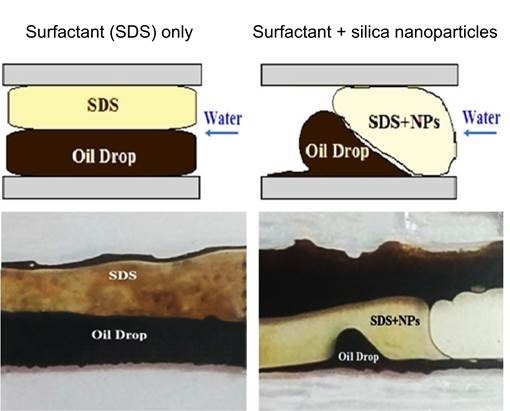Jul 19 2017

Image Credits: University of Swansea
A new class of materials which are suitable agents for oil displacing in enhanced oil recovery have been developed by scientists in the Energy Safety Research Institute (ESRI) at Swansea University and scientists at Islamic Azad University in Iran.
The new nanoparticle-surfactant complexes, composed of sodium dodecyl sulfate (SDS) surfactant and fumed silica nanoparticles (Si-NPs) have important applications in enhanced oil recovery (EOR). The materials are shown to improve the oil recovery by 58% compared to 45% recovery in the presence of surfactant alone.
The researchers led by Goshtasp Cheraghian and Professor Andrew R. Barron reported their find in the American Chemical Society journal Industrial & Engineering Chemistry Research (http://pubs.acs.org/doi/abs/10.1021/acs.iecr.7b01675).
Fabrication and testing of these materials were carried out by Goshtasp Cheraghian (Member of Young Researchers at Azad University) and Sajad Kiani, (a PhD student at the Energy Safety Research Institute at the Swansea University Bay Campus).
There, they used a 5-spot glass micromodel to evaluate the suitable agents for oil displacing in EOR. Such micromodel experiments have been used to investigate the mechanism of the fluid flow on porous mediums via flow visualization, pore space geometry, topology and heterogeneity effects, which are not possible to assess using traditional core-flood experiments.
It is a surprise that the addition of silica nanoparticles, essentially nano-sand, to the surfactant solution leads to such a large flow modification. the changes are due to an alteration of the viscosity as well as effective wettability alteration, which effects the sweeping of the oil towards the recovery point.
Professor Andrew R. Barron, Scientist, Energy Safety Research Institute
The results of this work support an improved insight into the role of NPs and surfactants in enhanced oil recovery and future use in EOR formulations. Barron described the multinational team as “a great example of international collaboration across boarders aimed at developing new materials for minimizing the impact of oil production through maximizing recovery.”
Co-authors of the papers are Dr Shirin Alexander a Sêr Cymru Research Fellow at Swansea University and Dr Nashaat Nassar an Associate Professor in the Department of Chemical and Petroleum Engineering, University of Calgary, Canada. Barron is the Charles W. Duncan Jr.–Welch Professor of Chemistry and a professor of materials science and nanoengineering at Rice University (Houston USA), and the Sêr Cymru Chair of Low Carbon Energy and Environment at Swansea.
This research was carried out with support from the Robert A. Welch Foundation, the Welsh Government Sêr Cymru II Fellowship Program, and FLEXIS, which is part-funded by the European Regional Development Fund (ERDF) through the Welsh Government.